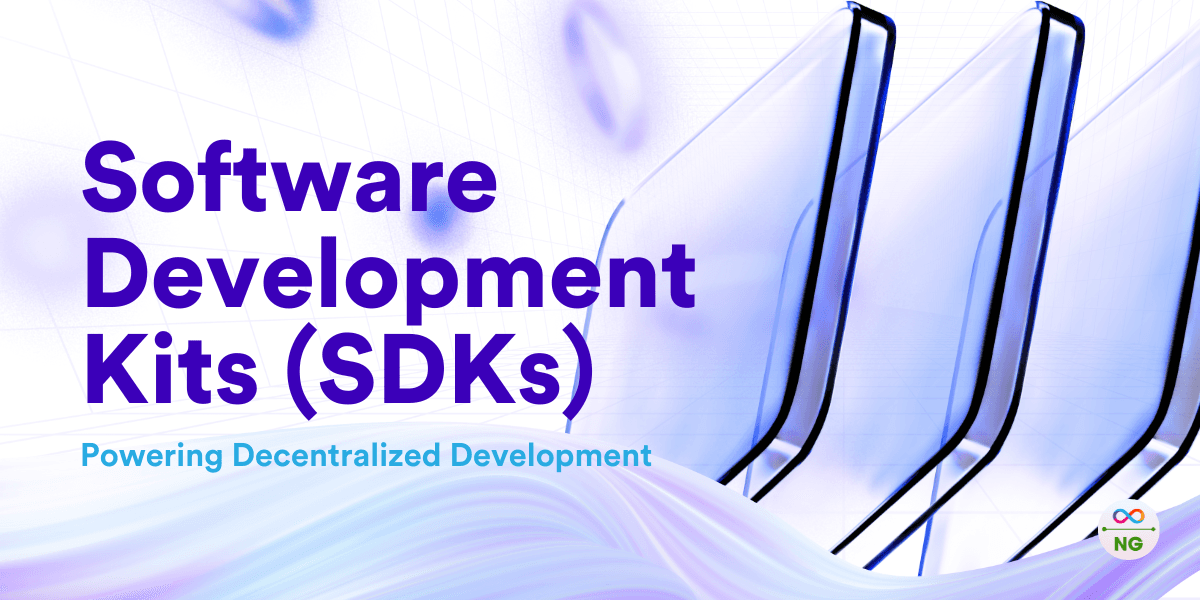
SDKs are a developer's best friend when it comes to efficiency. They provide pre-built tools and libraries that save you countless hours of coding, allowing you to get your dApp up and running faster than ever.
Decentralized applications (dApps) running at web speed and scale are reshaping the internet landscape, and the Internet Computer Protocol (ICP) is leading this transformation. It offers you the ability to build secure, scalable, and interoperable applications without the constraints of centralized servers.
To make development smoother, the ICP provides a suite of Software Development Kits (SDKs) that simplify the creation, testing, and deployment of dApps and canisters. These SDKs are essential if you want to harness the power of blockchain without needing to become a blockchain expert.
In this article, you'll discover the various SDKs available on the ICP, and learn about their features, advantages, and how they contribute to the growth of the decentralized web. Whether you're just starting out or you're already an experienced developer, understanding these SDKs is key to maximizing the potential of the Internet Computer.
What are SDKs and Why Do They Matter?
Software Development Kits (SDKs) are comprehensive toolsets that provide libraries, documentation, and utilities to facilitate software development. In the context of blockchain and Web3, SDKs play a pivotal role by abstracting complex protocols, enabling developers to build decentralized applications efficiently.
On ICP, SDKs simplify interactions with the blockchain, allowing developers to focus on creating innovative dapps without worrying about the intricacies of consensus mechanisms, data storage, or scalability. These SDKs also enhance security by providing standardized libraries for authentication, state management, and communication between canisters.
Key ICP SDKs for Developers
ICP offers a range of SDKs designed to cater to different aspects of dapp development. These include tools for front-end integration, back-end canister development, and seamless communication between components. The main SDKs used on ICP are:
- DFX SDK – A command-line tool for local development, testing, and deployment.
- Agent JS (JavaScript/TypeScript SDK) – Facilitates interaction between web applications and canisters.
- IC Rust CDK (Canister Development Kit) – Allows canister development using Rust.
- Motoko SDK – Designed for Motoko, ICP’s native programming language.
- Candid UI and Tools – Ensures cross-language compatibility and easy interaction with canisters.
Each of these SDKs serves a unique purpose, providing flexibility for developers to choose the right tools for their projects.
1. DFX SDK
The DFX SDK ( Distributed Functions eXecution) is the cornerstone of development on ICP. It is a command-line tool that manages the entire lifecycle of a dapp, from local development to deployment on the mainnet.
Features and Capabilities:
- Compiles canister code written in Motoko or Rust.
- Simulates the Internet Computer environment locally for testing.
- Manages identity, cycles, and canister state.
- Deploys canisters to both local replicas and live ICP networks.
Getting Started with DFX:
To use DFX, developers need to install it via command line. Once installed, they can create new projects, compile code, and deploy canisters using simple commands like:
dfx new my_dapp
dfx start
dfx deploy
DFX seamlessly integrates with both Motoko and Rust, making it versatile for developers with different language preferences.
2. Agent JS (JavaScript/TypeScript SDK)
The Agent JS SDK bridges the gap between front-end applications and ICP canisters. It allows developers to build web interfaces using JavaScript or TypeScript that can securely communicate with canisters on the Internet Computer.
Purpose and Functionality:
- Establishes secure communication channels between browsers and canisters.
- Handles message signing, sending, and response processing.
- Integrates with popular front-end frameworks like React and Vue.js.
Example Use Case:
Agent JS is ideal for building decentralized applications with a dynamic user interface. For example, a decentralized chat application can use Agent JS to send and receive messages securely from a canister.
3. IC Rust CDK (Canister Development Kit)
For developers who prefer Rust for backend development, the IC Rust CDK offers powerful tools to create high-performance canisters. Rust is known for its memory safety, speed, and concurrency, making it a great choice for building secure and efficient dapps.
Key Features:
- Provides Rust-specific macros and data structures optimized for WebAssembly (Wasm).
- Ensures type safety and memory security.
- Offers robust libraries for state management and asynchronous messaging.
Getting Started with Rust CDK:
Developers can set up the Rust CDK using Cargo, Rust's package manager. With Rust's powerful type system and the CDK’s integration with DFX, developers can build scalable canisters with minimal overhead.
4. Motoko SDK
Motoko is the native programming language of ICP, designed specifically for canister development. The Motoko SDK includes a compiler, standard library, and debugging tools, making it a comprehensive solution for building canisters on ICP.
Why Choose Motoko?
- It’s designed to leverage ICP’s architecture, optimizing performance and scalability.
- Offers seamless integration with Candid for cross-language compatibility.
- Provides a higher-level abstraction, reducing development complexity.
Motoko’s syntax is beginner-friendly, and its integration with DFX streamlines development, making it an ideal choice for new developers entering the ICP ecosystem.
5. Candid UI and Tools
Candid is the interface description language for ICP, enabling communication between canisters regardless of the programming language used. It ensures type-safe interactions and maintains compatibility across the ecosystem.
Main Features:
- Automatically generates type-safe bindings.
- Facilitates cross-language communication between Motoko, Rust, and other languages.
- Offers a user-friendly Candid UI for testing and interacting with canister methods.
Candid simplifies integration and boosts interoperability, making it easier for developers to build complex systems on ICP
Conclusion
ICP SDKs are revolutionizing Web3 development by simplifying the creation of decentralized applications on the Internet Computer. With tools like DFX for full-stack development, Agent JS for dynamic front-end integration, and Rust and Motoko SDKs for powerful backend canisters, developers can build scalable, secure, and efficient dapps.
As the ecosystem evolves, ICP’s SDKs continue to lower the barrier to entry, enabling developers of all skill levels to innovate and create decentralized solutions that redefine the internet.
Article by: Mana Lamja